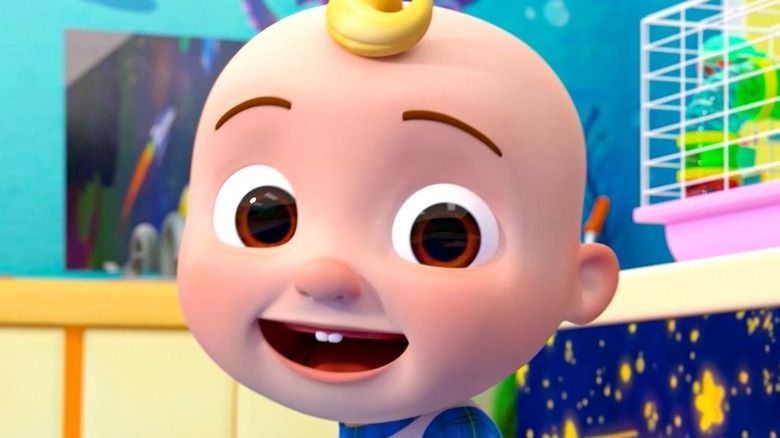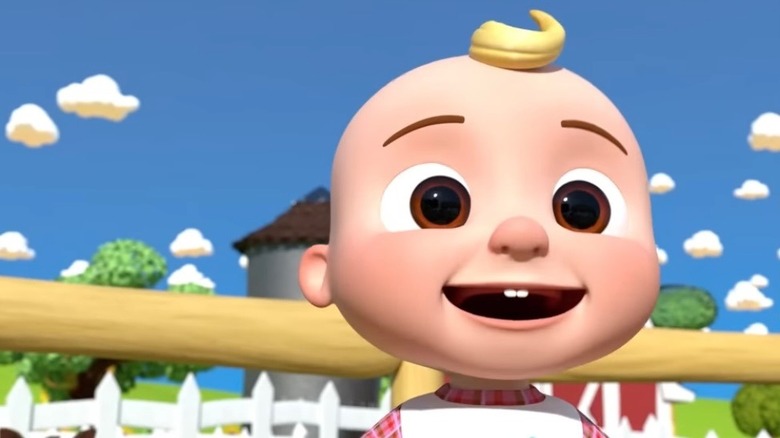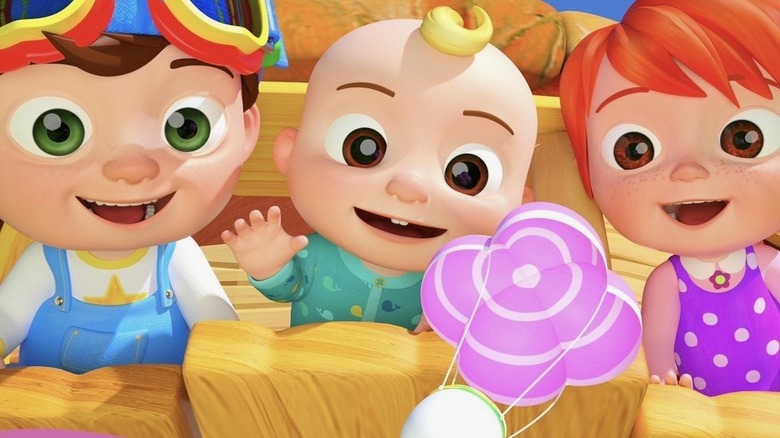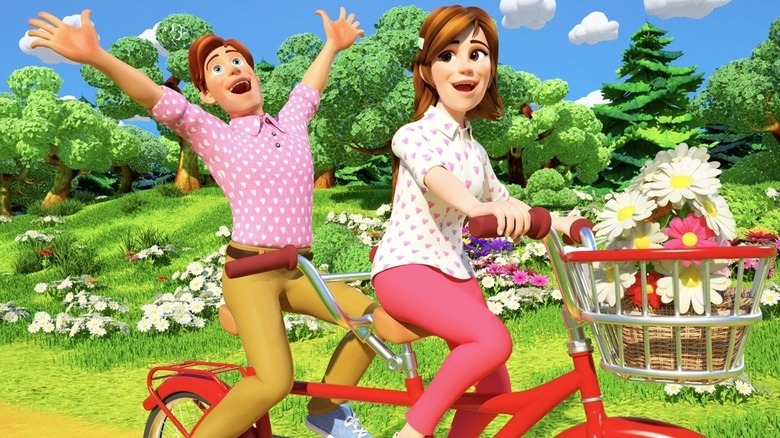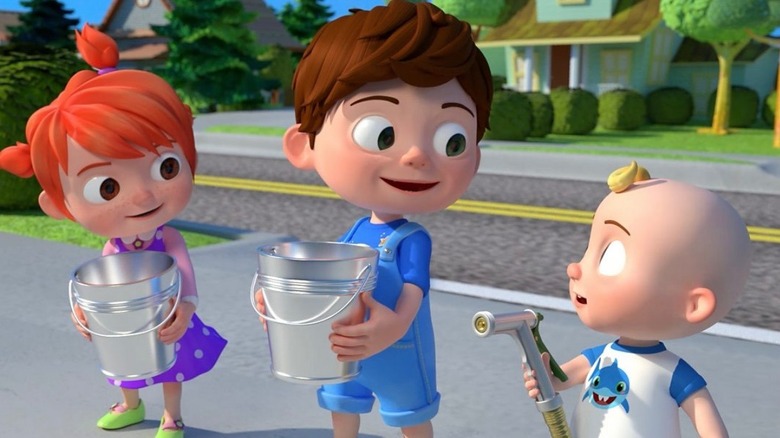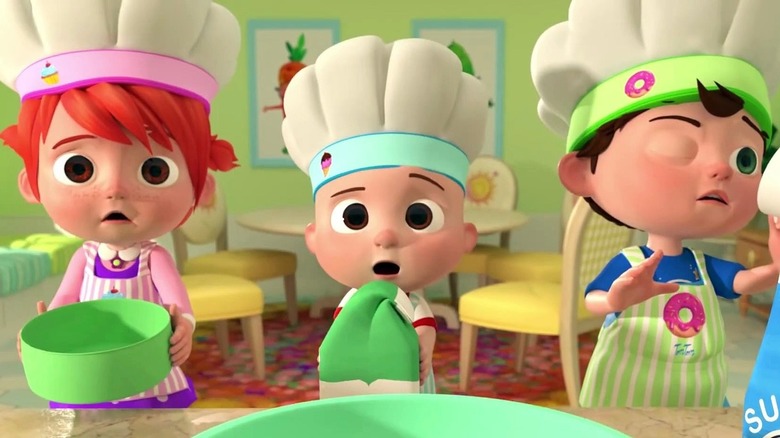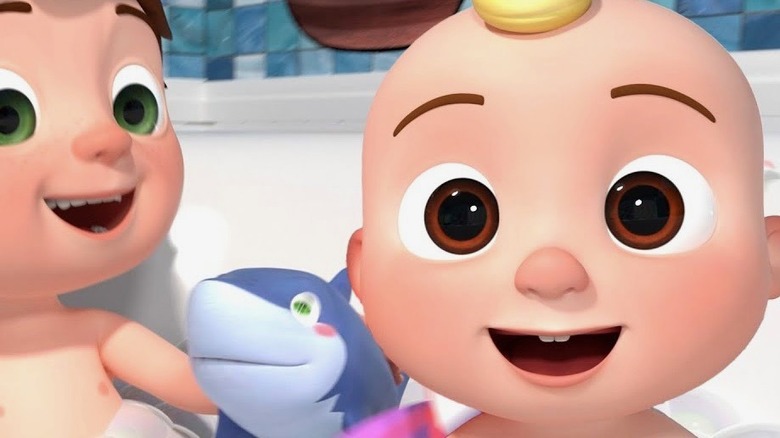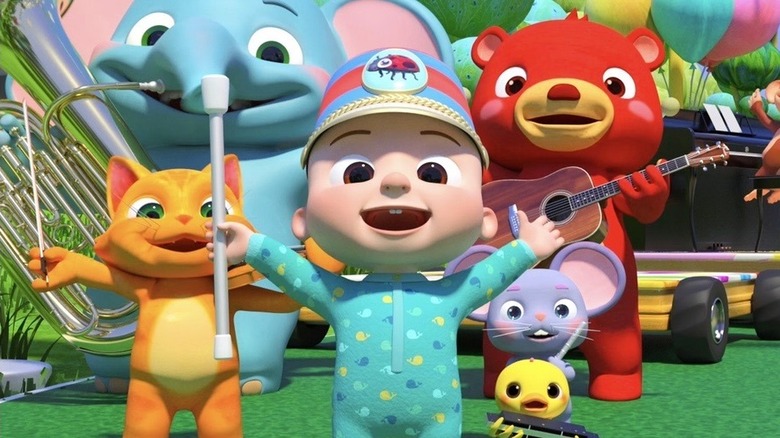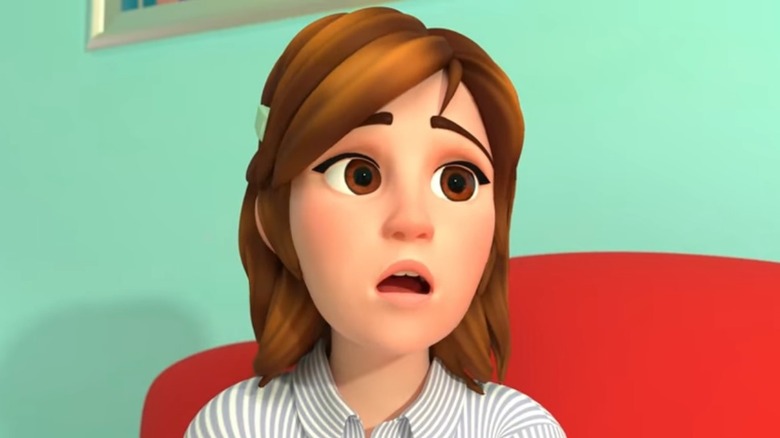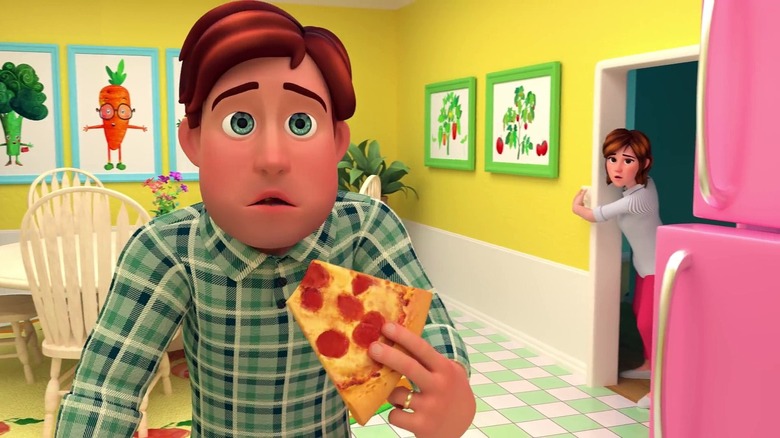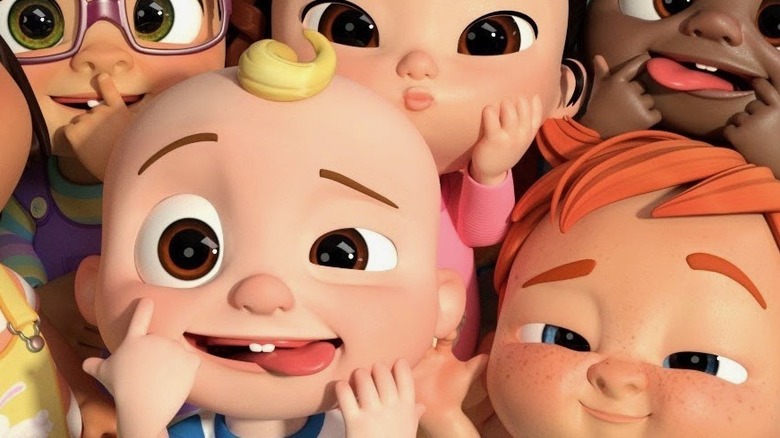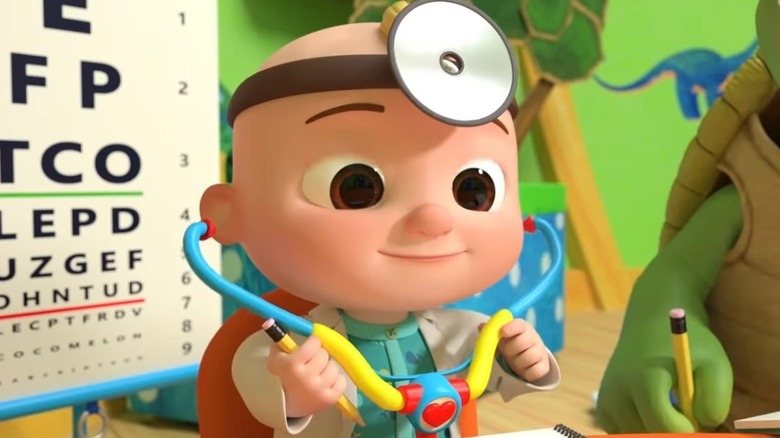Things Only Adults Notice In CoComelon
Love it or hate it, if you've recently procreated, "CoComelon" is now most likely a big part of your life. Currently, its YouTube channel has over 137 billion total views, and in total streaming across Netflix, Hulu, Amazon Prime, and YouTube, Nielsen streaming content ratings for 2021 clocked "CoComelon" at over 33.3 billion minutes of viewing. Even more staggering is that only 15 episodes were streamed outside of YouTube.
Most people think of the series as an overnight success, but creator Jay Jeon and his wife, a children's book author, released the first two videos on the YouTube channel way back on September 1st, 2006 under the name "ABC Kid TV." It wasn't until 2017 that they made the quantum leap from a more basic 2-D storybook style to the very recognizable 3-D animation with the characters we now associate the series with. And okay, with more than 11.2 billion views, "Baby Shark" is the most viewed YouTube video of all time, but "Cocomelon" more than doubles "Pinkfong" in subscribers with 142 million (the second most on YouTube).
Lizzy Easterday, lead creative executive for "CoComelon," shared her thoughts on the show's success with The Washington Post. "It has slow-tempo songs that are really distinct to the brand," she pointed out. "The camera is at the eye level of the preschooler. We are in the experience with them and seeing it at their level." But like every popular kids' show, parents and researchers seem to be split on whether "Cocomelon” is constructive or detrimental to a child's development. Good or bad, the kids have spoken. And since parents can't help but watch along, here's a few things that only the adults will notice in "CoComelon."
Who is CoComelon?
Although many kids excitedly shriek "CoComelon" at the screen every time they see those two front teeth and that single blonde swirl, "CoComelon" is actually the name of the YouTube Channel (and now streaming show). The kids are on the right track, as the blonde baby is the main character and his face has become synonymous with the show, but hordes of toddlers around the world have been surprised to learn that his name is actually JJ. The confusion is completely warranted considering the titles of many popular kids' shows are simply the name of the main character — "Bluey," "Peppa Pig," "Winnie the Pooh," "Daniel Tiger's Neighborhood," and "Arthur," to name just a few.
JJ, his Mommy, Daddy, his sister YoYo, his brother TomTom, and a slew of other friends, family, and animals collectively make up the world of "CoComelon." Granted, many parents are confused by this as well, but the fact that multiple videos that only featured animals were also titled "CoComelon" became the dead giveaway. Questions about the name were raised and ultimately answered with songs like "The Potty Training Song," where the family specifically says, "Great job, JJ!" Then, of course, there's the "JJ song" itself.
The inconsistent developmental stages of JJ
This one seems to affect parents in a big way. Throughout the entire "CoComelon" catalog, JJ displays the broadest spectrum of cognitive abilities. While enjoying the show, it would be near impossible for toddlers to pick up on the timing of developmental stages, but parents are increasingly more aware of the many leaps their children should be making around certain ages. The Huffington Post gathered numerous parental tweets about "Cocomelon," and many call out JJ's extraordinary abilities in a big way.
JJ's actual age has been estimated at anywhere from 1 to 4 years old, but in some cases, his intelligence would place him lower than a 1 year old, and a lot higher than the average 4 year old. In the episode "Baby Bump," JJ and his best friend Cody act as detectives, and uncover clues like a rattle, a pacifier, and a baby bottle to come to the conclusion that Cody's mom must be pregnant. In the episode "Humpty Dumpty," JJ giggles and babbles like a baby, then thinks of (and engineers) a parachute for an egg in an egg drop experiment. Pick a song. Any song. You'll see.
JJ's parents must be rich
Let's face it, hyper-realistic songs where the children are unable to do certain things because of their parents' hand-to-mouth financial situation makes for a better "Saturday Night Live" sketch than a kid's show. Mommy and Daddy's income is hopefully something that a show's younger viewers don't have to think about, but after scoping the family's house and the laundry list of fun activities they're able to do with the kids, more than a few older viewers have started wondering how JJ's parents are able to afford their lavish lifestyle.
Parents in the audience have discussed the house itself, since the color, furniture, and overall layout of each room changes song to song. In the song "Johny Johny Yes Papa (Parents Version)" the parents are seen in a quaint kitchen with pictures of vegetables decorating the walls, but in "Pat A Cake 2," the family walks into a bright yellow beehive kitchen. The initial version of "Johny Johny Yes Papa" shows a third version of their kitchen, which raises the question, "Is this family that well-off, or are they good friends with Chip and Joanna Gaines?"
With childcare at the forefront of any parent's mind, even the cost of JJ's pristine preschool, the Melon Patch Academy, has been called into question. Not that JJ's parents need to explain themselves, but their jobs are never mentioned, and they always seem to have ample time off to play with the kids. Must be nice.
JJ's parents are sometimes neglectful
Judging other parents' parenting? Now that's something every parent can get behind. Kids definitely wouldn't notice this, and even if they did, they'd most likely be a little jealous of JJ and his siblings' freedom. With the children being left unattended, bouncing around town without parental supervision, it's easy for any parent to wonder about the lackadaisical rules in this family's household.
The "Car Wash Song" video, for example, suggests that a preschool trio can wash a car unattended — and the whole thing will strike any parent viewing as even more irresponsible when they notice that the kids are doing this only steps away from a busy road with double solid yellow lines.
Popular YouTuber That Vegan Teacher gave JJ and siblings' breakfast a massive fail. While reviewing the "CoComelon” cut "Breakfast Song," she pointed out the fact that processed meats like bacon and ham are "Classified as Class 1 carcinogens by the World Health Organization," and noted that the children's unhealthy breakfast consists entirely of pancakes, syrup, waffles, whipped cream, bacon, ham, and white bread with jam. Which is all fried up on a hot stove with (again) zero parental supervision.
Epiphanies about song lyrics
Many of the things only parents notice about "CoComelon" are nitpicks within the world of the show, but they aren't all bad. For example, there's the "CoComelon" rendition of the classic song "Pat-A-Cake," which has served as an education for some parents who grew up singing it as "Patty Cake." Of course, other kids (and parents) may have only ever known the song as "Pat-A-Cake," but for those who've been singing "Patty Cake" all along, you can take comfort in the fact that this is very common, and widely accepted as well.
According to Misbar and LA Weekly, the nursery rhyme (originally titled "Pat-A-Cake") was written in 1698 for English writer and composer Thomas D'Urfey's play "The Campaigners." It became widely popular when it (along with several other classic nursery rhymes) was published in "Mother Goose's Melody" by John Newbery in 1765.
"Pat-A-Cake" or "Patty Cake" has been debated for decades, but experts like Sunn m'Cheaux — a Gullah language teacher from Harvard University — claim that "Pat-a" was pronounced "Patty" in different languages and dialects. This seems to be the case since a "Patty Cake" only exists in the minds of the children molding it, patting it, and marking it with a B (or whatever their first initial happens to be).
Sung to the tune of classic songs
"CoComelon" has served up fresh renditions of several (okay, a lot of) nursery rhymes, some of which they've opted to put their own unique spin on. When children like a song, they don't question its origins, but while listening to these "CoComelon" originals, parents won't be able to help but notice distinct similarities with songs that they, their parents, and even their grandparents grew up with. "Winter Show and Tell at School" is sung in the tune of "On the First Day of Christmas," and "Bath Song" (the most popular video on their channel with over 5.8 billion views) has original lyrics, but the verse is sung to the tune of "Itsy Bitsy Spider" with the chorus to the tune of "Baby Shark."
Children's songs performed to the tune of classic nursery rhymes is actually quite common. Some of our most well-known nursery rhymes, like "ABC," "Twinkle Twinkle Little Star," and "Baa Baa Black Sheep," are actually all sung in the same tune and tempo. These songs and some variations composed by Mozart share one common ancestor: The hit 1740 French folk song "Ah, vous dirai-je, Maman," which in English translates to "Ah, Mother, if I could tell you." Much like a movie or TV character watching a movie or TV show from several decades ago, current children's songs that use classic nursery rhymes are more often than not doing so to avoid copyright infringement. Not to mention the fact that it helps a new song's chances of success. The classics are classics for a reason.
Repetition in each song amplifies the catchiness
The toddlers in the audience may not understand why these songs get stuck in their heads so quickly, but it drives parents everywhere absolutely bonkers. It's no secret that "CoComelon" songs (and countless other kids' songs, for that matter) are drilled into our heads by repeating the most basic lyrics over and over again. As Calvin L. Gidney, the associate professor in Tufts' child study and human development department, told The Washington Post, "Repetition teaches children early literacy skills. It helps them learn new words, and it helps them internalize what a story structure is."
Whether we like it or not, subconsciously we all take this into adulthood. In an NPR feature aptly titled "The More, The Better: Repetition Propels Songs Up The Charts," USC Professor Joseph Nunez bluntly states, "Songs that are more repetitive do better. Once you got on the Hot 100, the more you repeated the chorus, the more word repetition, the less complex the song, the better it did." The same is true for the melody. Research published in the academic journal "Psychology of Aesthetics, Creativity, and the Arts" found that earworms tend to be slightly uptempo songs with generic melodies.
The length of each shot
While your child blankly stares at the screen with their jaw on the floor, you can rest assured they're not counting the seconds of each shot. For parents who are constantly trying to find the proper balance between entertaining their children or zombifying them, the pace of a show has become very important. There is no shortage of new shows vying for the attention of young viewers, but when parents and experts are asked if "CoComelon" specifically is safe or hyper-stimulating for children, the answers seem to be split right down the middle.
The TikTok video "Cocaine Melon" clocks "My Little Pony" shots at 4-6 seconds, but "CoComelon" shots at only 1-3 seconds in length. This and a follow-up video showing that every "CoComelon" shot moves (zooming in or out, and panning side to side) sparked over 300 parents to weigh in on the Parenting Subreddit. Rebecca G. Cowan, Ph.D, a professor of social and behavioral sciences at Walden University, told Parenting.com, "Without empirical research on the show 'CoComelon,' there is no data to substantiate claims that this show is overstimulating due to the pace of the scenes." Until that time, parents will have to take to Reddit, or just Google "Is 'CoComelon' good for kids?" and see the coin flip of yeses and nos.
The parents have a weird relationship
Unless there's some serious trouble in paradise, children viewers in general rarely pick up on the subtle nuances of a couple's relationship. After watching the video for "Johny Johny Yes Papa (Parents Version)," it isn't hard for any adult viewer to pick up on the sneaking around, the distrust, the judgment, and the outright lying. The video opens on the father sneaking into the kitchen in the middle of the night for a slice of pizza. The mother then flicks on the light in a real "gotcha" moment, and you'd think that would lead to her exclaiming, "Pizza! Nice, heat me up a slice, please!" But she judges him as if he's straying from their strict diet. The father then catches and judges her for enjoying some ice cream. It gets a tad off-putting when they both lie about it twice, and have to ultimately open their mouths to expose the lie.
"CoComelon's" first version of "Johny Johny Yes Papa" is more true to form, with JJ playing Johny, getting caught eating sugar, and lying about it. The father finds it cute that JJ says he wasn't eating sugar when he clearly has some in his mouth, but the cuteness just isn't there when the parents treat each other like children. The kids are in bed. You've both successfully kept them alive for another day, so kick back with a snack or a beer (or both). You've earned it.
The facial expressions are the stuff of nightmares
Adult nightmares, that is. Young viewers clearly don't have this cynical outlook (yet), because they seem to be all in on the many characters of "CoComelon." And, let's face it, there would be a massive problem if the kids were waking up every night with nightmares. Parents can get behind anything that is suitable for children, but in this case, the surrounding adults (the innocent bystanders) note being completely creeped out by the slightly haunting, almost Chucky-like facial expressions of each character.
For a little over a year, Matt Rooney of Collider lived with his brother, his brother's partner, and their first child. After being exposed to countless hours of "CoComelon," he reported, "It's the animation that will plague your dreams. Soulless eyes and smiles of equal shape beam off the screen as if to ask, 'Can I be your friend forever and ever and ever and ever?' Caricatures seemingly built to mock the human form, the key family of five are stiff and off-putting and able to cause instant delirium to those who look upon them."
From "The Exorcist” to "The Shining," "Children of the Corn," and "The Ring," there is no shortage of horror movies involving creepy children. This theme is basically its own horror sub-genre. We clearly find something terrifying about the eerie, lifeless smiles that are innocent enough to keep us from running for the hills, but luring us in for something far more sinister.
The first aid in CoComelon is less than ideal
When a toddler gets a boo boo, they usually want no part in the washing and dressing of the wound, but the parent (in most cases) knows an infection could set in quickly. In looking over the few instances of first-aid in "CoComelon," it doesn't take a medical professional to see the issues, but we found one anyway. Doctor Mike Varshavski — Board certified in Family Medicine, and the number one health and medicine influencer on YouTube with over 10 million subscribers — reviewed "The Boo Boo Song" and noticed that when Cody falls and scrapes his knee, his mother simply puts a bandage over it without washing and/or disinfecting the wound.
Other red flags involve putting a bandage on a stubbed toe, listening to a patient's lungs from the front instead of the back, and the most egregious of all, the use of an otoscope — the very pointy tool used in the patient's ear — on the patient's eye. Doctor Mike warns viewers to use the very flat ophthalmoscope for eye inspections, and states, "If you do that on a medical standardized exam, you would fail!"
During "Sick Song" JJ is sick, and when his mom sneezes at the end of the song, JJ and his father laugh. Parents everywhere will tell you how often they've been sick because of their kids, and would not laugh along with this. And to bring things full circle, Doctor Mike continuously refers to JJ as "CoComelon."
